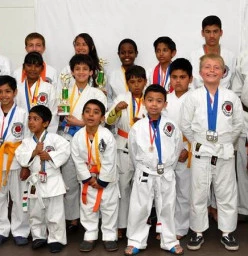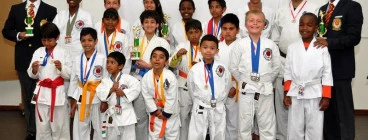- 120 Ivy Road,, Norwood 2192, Gauteng
- 2-5 km from Houghton
- Business can travel to you
- Awards: #15 Most Popular in Johannesburg for 2023
Karate Activities for Kids - Houghton (2198)
Johannesburg, Gauteng
Best match results for karate activities for kids in Houghton + 5km.
Martials arts training for kids, teens & adults Ultimate Martial Arts and Fitness is an ATA SA and MASA affiliated Songahm Taekwondo school. Teaching self defense, life skills and the art of Martial Arts. - Tiger Classes: Age 3 to 6 - Karate Kids Classes: Ages 7 to 13 - Extreme Martial Arts Classes: All Ages - Ladies Only Classes - Special Needs Classes - Adult Classes Classes run from Mondays to Fridays Benefits of Taekwondo Developing Self-Esteem at Ultimate Martial Arts and Fitness... Read more
Other related businesses in and around Houghton (within 20km)
OVERVIEW There is no better all round activity than karate. Benefits include self-defence, physical conditioning, enhanced mental function and numerous life-skills such as confidence and discipline. Train at South Africa's pre-eminent karate group with an 8-time World Karate Champion for specialised, authentic Japanese karate training. Classes for all ages (from 4yrs and older) and belt levels, including adults. Specialised, uniquely structured classes for 4 - 6 year olds. BENEFITS... Read more
Bryanston Karate: Cultivating Excellence in Martial Arts and Personal Development At Bryanston Karate, we offer a dynamic and enriching program tailored for individuals from the age of 5 years to adults. Our unique approach combines the rigor of martial arts with the excitement of engaging activities, creating an environment where physical exercise, martial arts skills, interactive games, and challenging obstacle courses come together in harmony. This blend captivates children's interest and appeals... Read more
Two no obligation trial sessions
We welcome you to have two no obligation trial sessions to get a feel of what we offer. We hope to see you soon.
First week is free. Come trial the best martial arts around
We like our members to be happy and committed … try it first on us. We teach traditional self defence martial arts. Practical self defence martial arts mixed with the tradition of Okinawa martial arts.
40% off Saturday Classes
Validity: from 10 Oct 2020 to 31 Dec 2025
For students who can only train on Saturdays, we offer 40% off your fee! If you, or your child can only make it on a Saturday, no problem. Come train and experience the benefits of authentic karate in a beautiful setting. 1 member: R330 2 members: R620 3 members: R900 4 members: R1160 Available to all aged 5 to forever! Enjoy karate as a family at an affordable rate, at one of the most beautiful karate schools in the province!
We train children from the age of 5 years and up in the, Funakoshi Style of Shotokan Karate, the most popular karate style. Our club based in Johannesburg's Northern Suburb of Sunninghill has existed since 2006. Our Chief instructor Kyle Funakoshi is a 9th Dan Black belt. Our international head office is based in Milpitas, California, USA, Headed by Kenneth Funakoshi, direct family to Karate Legend, Master Gichin Funakoshi the founder of modern Karate. We have 2 dojo's in the Sunninghill... Read more
We offer tuition to all levels of students ranging from beginners to advance. Classes are divided into age and belt color. Students may start Karate from the age of 4 yrs. Classes are run Monday to Thursdays as well as Saturday mornings. We have just built our state-of-the-art dojo purely for karate training. Please feel free to join us for two free trials lessons. Read more
We offer full contact and non contact karate classes for kids and adults of all ages. Our focus is on fitness, flexibility, kata, weapons, self-defence and fighting. We also offer pre and Primary School programs where we come and teach our 30 and 45 minute lessons at your school. As an extra we offer self-defence for schools , companies and specific women's self-defence courses. Read more
We have classes available for students from 3 years and up. The benefits of karate training are endless. Our classes offer you multiple training partners, high energy dynamics, and development of strong spirit. Perhaps the most important aspect is belonging to a group of like-minded individuals who support you and urge you to become the best versions of yourself. Our classes focus on strong technique & form, the understanding of kata (forms) performance and bunkai oyo (application), physical fitness,... Read more
- 34B georginia street (Hervormde Kerk - Hall), Horison 1724, Gauteng
- 10-20 km from Houghton
Badgers Karate Academy, led by Danika Stevens, a senior protea, national champion, and international medalist, is an excellent choice for anyone looking to learn goju-ryu karate. With over 20 years of experience and a 4th dan black belt, Danika brings valuable expertise to her classes. The academy welcomes students of all ages, starting from 5 years old, and classes are held every Monday and Wednesday from 18:00 to 19:00 at their location on 34B Georginia Street in Horison, Roodepoort. Sign up now... Read more
Budo Karate-Do South Africa teaches the Shito-Ryu form of KARATE. It has clubs in Hillcrest, Waterfall, Westville, Pinetown, Bluff, and Scottburgh areas of Kwa-Zulu Natal and Kempton Park Gauteng, South Africa. Our head Instructor for Budo Karate-Do South Africa is Kyoshi Kelvin Daniels, and he holds the rank of 7th Dan. Karate is a disciplined sport, and we should, at all times, endeavour to use Karate as a vehicle for the perfection of our character, thereby striving to become the person we were... Read more



































